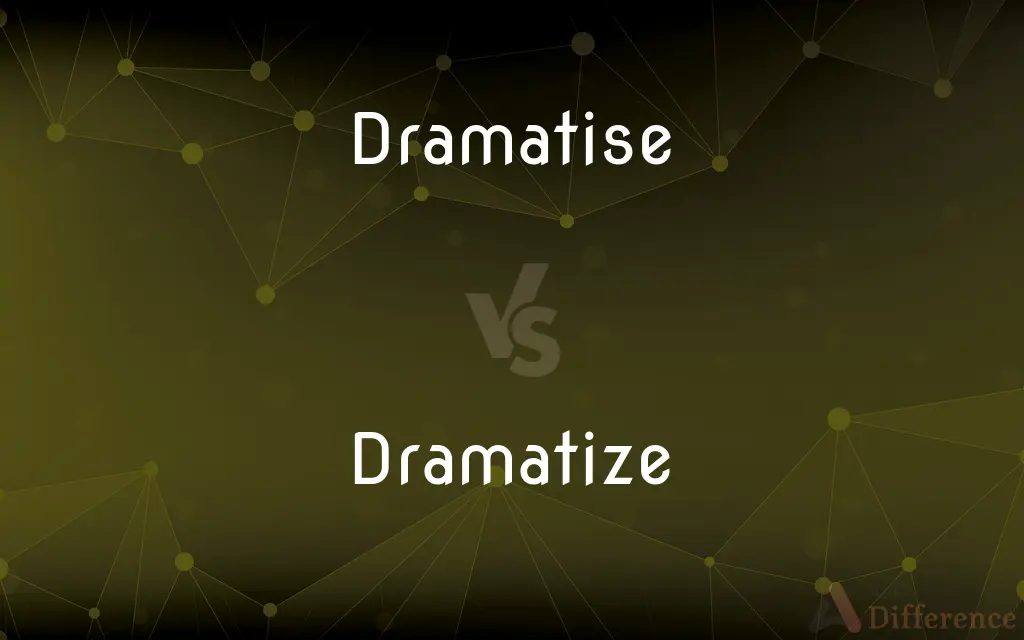Dramatise vs. Dramatize — What's the Difference?
By Fiza Rafique & Maham Liaqat — Updated on March 25, 2024
Dramatise and dramatize both mean to adapt a narrative for theatrical performance, but "dramatise" is preferred in British English, while "dramatize" is the American spelling.

Difference Between Dramatise and Dramatize
Table of Contents
ADVERTISEMENT
Key Differences
Dramatise is the spelling commonly used in British English to describe the process of adapting a narrative into a drama or play, whereas dramatize is the American English spelling of the same term. Both spellings refer to the same action of converting stories or events into a dramatic format, suitable for performance or emphasizing the dramatic aspects of the events.
When it comes to literary criticism or academic writing, the choice between "dramatise" and "dramatize" often depends on the regional spelling conventions of the publication or institution, with "dramatise" being favored in British English contexts, on the other hand, "dramatize" is predominantly used in American English settings.
While the spelling differences highlight the linguistic variations between British and American English, the essence and implications of the terms remain identical, aiming to transform narratives into engaging, dramatic presentations.
The choice between these spellings does not affect the interpretation of the text or the quality of the adaptation; rather, it reflects the writer's or publisher's adherence to regional spelling norms.
In the context of software, media, or international collaborations, "dramatize" might be used more universally, regardless of the traditional British preference for "dramatise," signifying a trend towards standardization in global English usage.
ADVERTISEMENT
Comparison Chart
Spelling Region
British English
American English
Usage
Preferred in UK-based publications and writings
Preferred in US-based publications and writings
Linguistic Variation
Reflects British spelling norms
Reflects American spelling norms
Impact on Meaning
No difference in meaning
No difference in meaning
Global Usage
May be used internationally but less common
Increasingly used in international contexts
Compare with Definitions
Dramatise
To adapt a narrative for theatrical performance or emphasize the dramatic aspects of an event.
The novel was dramatised for the stage, bringing the characters to life.
Dramatize
May also mean to overstate the seriousness or dramatic nature of something.
Critics argue that the film dramatizes the dangers of technology excessively.
Dramatise
Frequently used in British media and literature contexts.
The BBC announced a new series that dramatises the life of the famous poet.
Dramatize
To adapt a story or event for dramatic presentation or emphasize its dramatic elements.
The book was dramatized into a popular movie series.
Dramatise
Involves the creation of dialogue, stage directions, and character development.
The writer skillfully dramatised the historical events, making them compelling for audiences.
Dramatize
Involves crafting dialogue and action that convey the essence of the original narrative.
The screenplay writer managed to dramatize the novel’s intricate plot successfully.
Dramatise
Can also mean to make something appear more dramatic or important than it is.
The documentary tends to dramatise the conflict to capture the viewer's attention.
Dramatize
Adheres to American English spelling norms.
The article discusses how modern playwrights dramatize themes of identity and conflict.
Dramatise
Reflects British English spelling conventions.
In her thesis, she explores how Shakespeare's works have been dramatised over the centuries.
Dramatize
Common in American publications and academic discussions.
The university's drama department will dramatize a classic American play this fall.
Dramatise
(British spelling) dramatize
Dramatize
To adapt (a story or literary work) for dramatic presentation, as in a theater or on television or radio.
Dramatise
Put into dramatic form;
Adopt a book for a screenplay
Dramatize
To present or draw attention to in a dramatic way
The novel dramatizes her disastrous marriage. The demonstration was organized to dramatize the problem of poverty.
Dramatise
Represent something in a dramatic manner;
These events dramatize the lack of social responsibility among today's youth
Dramatize
To be adaptable to dramatic form
A story that dramatizes well.
Dramatise
Add details to
Dramatize
To adapt a literary work so that it can be performed in the theatre, or on radio or television
Dramatize
To present something in a dramatic or melodramatic manner
Dramatize
To compose in the form of the drama; to represent in a drama; to adapt to dramatic representation; as, to dramatize a novel, or an historical episode.
They dramatized tyranny for public execration.
Dramatize
Put into dramatic form;
Adopt a book for a screenplay
Dramatize
Represent something in a dramatic manner;
These events dramatize the lack of social responsibility among today's youth
Dramatize
Add details to
Common Curiosities
Does the choice between dramatise and dramatize affect the meaning of a text?
No, the choice of spelling does not affect the meaning or interpretation of the text.
What is the difference between dramatise and dramatize?
The primary difference is spelling: "dramatise" is British English, and "dramatize" is American English. The meaning of both words is the same.
Can I use dramatize in British English?
While "dramatize" is not the preferred spelling in British English, it is understood and occasionally used, especially in international contexts.
Is one spelling more correct than the other?
Neither spelling is more correct; the choice depends on the regional spelling conventions of the writer or publication.
Are there any contexts where one spelling is preferred over the other regardless of regional conventions?
In international publications or when writing for a global audience, "dramatize" might be used more frequently due to American English's broad influence on international media and literature.
Are there any other differences between British and American English similar to this?
Yes, there are many examples of spelling differences between British and American English, such as "colour" vs. "color" or "realise" vs. "realize".
Can the spelling vary within the same document?
Consistency is key in any document, so choose one spelling and stick with it throughout.
Do these terms apply only to theatrical adaptations?
While often used in the context of theater, they can also refer to adaptations in film, television, and other media.
Is it common for non-native speakers to mix these spellings?
Yes, non-native speakers may mix these spellings, especially if they are exposed to both British and American English.
How do I know which spelling to use in my writing?
Consider your audience and the regional spelling norms of the publication or institution for which you are writing.
Can either term be used figuratively?
Yes, both "dramatise" and "dramatize" can be used to describe making something seem more dramatic or important than it is.
Can the choice of spelling reflect the writer’s cultural or geographical identity?
Yes, the spelling choice can sometimes reflect the writer's cultural or geographical background, indicating whether they follow British or American English conventions.
Do dramatise and dramatize have the same grammatical usage?
Yes, both words function the same grammatically and can be used interchangeably, depending on the spelling convention followed.
Has global English affected the usage of these terms?
Global English has led to a greater mixing of British and American spellings, making both forms of words like "dramatise" and "dramatize" more universally recognized.
Are there online tools to help decide which spelling to use?
Yes, there are online dictionaries and style guides that indicate the preferred spelling in British and American English, which can help writers choose the appropriate form.
Share Your Discovery

Previous Comparison
Sightseeing vs. Tourism
Next Comparison
Edge vs. LipAuthor Spotlight
Written by
Fiza RafiqueFiza Rafique is a skilled content writer at AskDifference.com, where she meticulously refines and enhances written pieces. Drawing from her vast editorial expertise, Fiza ensures clarity, accuracy, and precision in every article. Passionate about language, she continually seeks to elevate the quality of content for readers worldwide.
Co-written by
Maham Liaqat















































